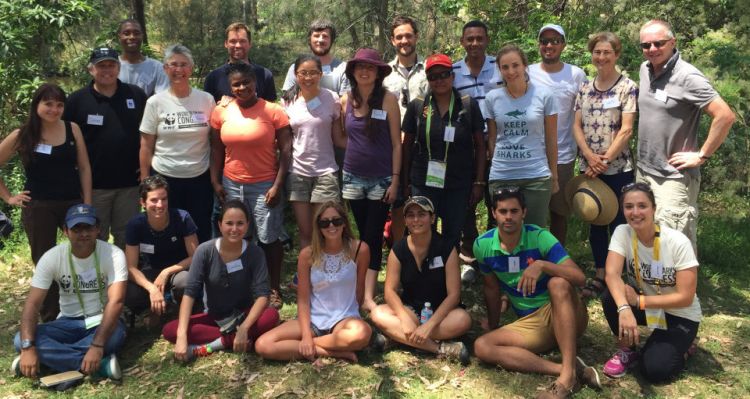Conservation's next generation
A global perspective of generational challenges in conservation
By James Hattam
Crossing the Parramatta River on Silverwater Road in the midst of peak hour traffic may seem like an obscure place to learn of the inspirational raise of Yolanda Kakabadse from founding a fledgling and bare-bones environmental NGO in the Republic of Ecuador to become the current President of World Wide Fund for Nature - International (WWF). As part of the IUCN World Parks Congress in Sydney last month, this is where I found myself.
I was privileged to participate in WWF's Next Generation event and spend a day with a group of emerging young conservationists from all corners of the globe. We joined with Yolanda Kakabadse in Lane Cove National Park (NP) to share stories and discuss the global conservation challenges we all face in our own communities. Journeying from Sydney Olympic Park to Lane Cove NP, Yolanda shared anecdotes and enlightening experiences of her career to date, from Minister of Environment in the Republic of Ecuador to president of the International Union for Conservation of Nature (IUCN). Yolanda, a trained psychologist and self-confessed non-biological scientist, has dedicated her endeavours to promote the benefits of conservation, the involvement of civil society and advocate for sustainable development in her home of Latin America and across the world.
After stepping off the bus at Lane Cove NP my instincts kicked in and I immediately searched for patches of shade to shelter from the intense sunshine; it is fair to say that as a well acclimatised southerner I was struggling with a 40 degree Sydney day in November! At one point as we followed the undulating walking trail I'm convinced I spotted a magpie panting in an attempt to get some respite from the heat, or perhaps the magpie was laughing at the struggling Tasmanian.
Walking through the eucalypt forest and woodlands provided the ideal backdrop to share stories and learn of the great work others from around the world are part of. From Marine Protected Areas in Madagascar to community managed reserves in India, the immense passion and dedication of these young professionals was clear as soon as each person began to speak. Over lunch on the banks of the Lane Cove River, Yolanda led a discussion on the global challenges for conservation and the opportunities for the next generation.
The overwhelming theme from each contribution was the need to have meaningful community participation which appeals to people's social and cultural identity, and fosters an on-going connection with the benefits of the natural environment. The need to effectively communicate with the civil society also resonated through many stories. In an age of innovation and technology, we as conservation professionals need to utilise technology to engage and inspire across generations to appreciate the benefits of conservation and connect with the natural world. Without community ownership of protected areas, conservation efforts are doomed to fail.
That afternoon I left Lane Cove NP with a sense of hope and resolve to take the stories I heard from around the world that day back to my work on the Protected Areas on Private Land Program, to ensure the benefits of private land conservation efforts across Tasmania and the communities that drive it are appreciated.
In a time of drastic change across the planet, where communities are more frequently becoming detached from their environments, the plight of the natural world can become overwhelming. The need for us to effectively engage and meaningfully involve local communities in conservation efforts is an imperative to ensure conservation stays relevant in our society. The next generation's youthful enthusiasm and passion for the natural environment is something to be fostered. Through these traits, coupled with the sharing of knowledge and wealth of experience from older generations, key lessons can be learned and the movement for change encouraged.
In his watershed opening address at the last IUNC World Parks Congress in Durban 2004, the late Nelson Mandela, champion of empowering the world's youth in addressing global challenges, provided some advice in true Mandela fashion:
"You may very well be a little curious to hear what an old man without a job, office, power or influence, and with his roots far in the past, is going to say about challenges for the future! The future is after all, in the hands of the youth."
Listen to Nelson Mandela's opening address to the IUNC 2004 World Parks Congress in Durban 2004.

James Hattam (rear back in the centre) enjoys the company of the next generation of conservation leaders at Land Cove National Park. Yolanda Kakabadse, President of WWF-International, is third from the left in the middle row, and Rob Purves, TLC supporter and President of WWF-Australia stands on the far right.

